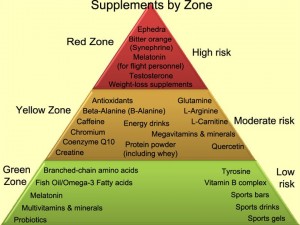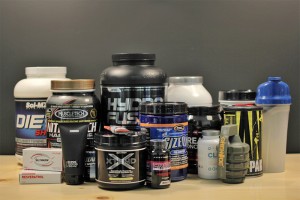By Eva Vitucci
As 2018 makes its grand entrance, so does the ever trending hashtag #NewYearNewMe. This hashtag is frequently used in reference to the undertaking of a healthier lifestyle, and for those hashtag enthusiasts, is often followed by #FitFam and #LegDay. Shifting to a healthier lifestyle can be a monumental challenge, but often one of the most rewarding. It can also be a slow process, resulting in the delayed usage of the desirable #Transformation #Fitspiration #Gains posts.
In and out of the gym environment, we’re constantly bombarded by ads, commercials, and fellow gym members all ranting about their quick solutions to dropping pounds, gaining muscle, or getting “bigger, faster”. It’s likely that some of these quick solutions involve the use of easily obtainable dietary supplements. In 2016 it was estimated that 70% of Americans use some form of dietary supplement. The uncomfortable truth is that while many of these dietary supplements claim to improve health and fitness, their use is often connected with emergency room visits, hospitalizations, and in extreme cases, death.
Unfortunately, the link between dietary supplement use and negative health impacts is not new and not surprising. This is likely because the selling of these supplements is not controlled by the U.S. Food and Drug Administration (FDA). The FDA is the U.S. government agency that ensures the safety of the food, drugs, and even the cosmetics sold in this country. They ensure there is scientifically sound evidence to support safe human and animal usage of these products. However, the FDA is not legally permitted to conduct research and lead safety investigations on dietary supplements before they have hit our markets. Find out why here. Only after certain evidence is collected – such as hospitalizations – can the FDA then begin an investigation into assessing the safety of the supplements and confirming the identity of all the ingredients.
Assessing the safety of supplements for human health is a multi-step process. A major stage of which is assessing whether the supplement or a particular ingredient induces liver damage. The human liver is one of the largest organs in the human body, and plays a key role in removing chemicals and breaking down drugs in our body. For example, our livers break down the alcohol that is transferred from our stomach to our bloodstream after drinking. Excessive alcohol drinking can exhaust our liver, preventing it from completing its many other essential tasks like storing sugar for when our bodies need the extra energy. Like excessive drinking, supplements can also damage our liver. Supplements with high steroid levels hamper the liver’s ability to dispose of its waste products. Another extremely common and natural supplement used to alleviate depression, St. John’s wort, can cause the liver to break down FDA-safe drugs too fast (e.g aspirin, birth control, etc.), such that they lose their effectiveness.
Ultimately the usage of dietary supplements is a potentially dangerous game. Though their big promises of easy slimming, fast burn, and large gains are tempting, the decision to take supplements should not be taken lightly, and people should be aware of the often-overlooked risks. Many of these supplements can simply be acquired from our diets, the same way Popeye got his #Gains (#NOTFakeNews). Thus, avoiding dietary supplements or consulting with a doctor beforehand is a much safer way to accomplish a healthier life transition, and achieve #NewYearNewMe status and #Gains in the new year.
Edited by Clare Gyorke and Chad Lloyd




